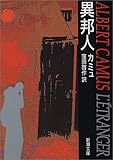カミュが異邦人の英語版に寄せた自序の日本語訳を作ってみた
アルベール・カミュが異邦人の英語版に寄せた自序(Préface à l'édition américaine)の英語訳を用いて日本語訳を作りました(自分はフランス語がまったく読めないので、原文は当たれていません)。誤訳が沢山あると思いますので、もし発見したらコメント欄等でご指摘いただけると助かります。
作成した訳文
昔、私は非常に逆説的であるとは承知の上で、異邦人をある一文に要約した。「我々の社会では、母親の葬式で泣かないものはみな死刑を宣告される恐れがある」私はただ、この本の主人公が規則に沿って行動をしなかったがために死刑を宣告された、と言いたかったのだ。この意味で、彼は自らが暮らす社会において異邦人である。静かで官能的な生活の周りを、社会の郊外を、彼はさまよっている。一部の読者が彼を社会からの落伍者とみなすよう誘惑されたのはこの理由からである。しかしもし彼の性格をより正確に描こうとするなら、もう少し正確に言えば作者の意図により一致させたいと望んでいるなら、なぜムルソーは規則に沿って行動をしようとしなかったのか、と自分で自分に問うてみる必要があるだろう。この答えは単純だ。彼は嘘を付くことを拒否したのだ。「嘘を付く」というのは本当のことを言わないということだ。さらに言えば、実際のところ、特にあること以上のことを言ったり、人のこころについてのことで、感じたこと以上のことを言ったりすることも指すのだ。生活を単純化するために、我々は毎日そうしている。しかしムルソーは見かけとは逆に、生活を単純化させようとはしない。彼は自分がどうであるかを言い、自らの気持ちを隠すことを拒否する。すると社会は即座に自らが脅かされたように感じる。例えば彼は昔ながらの方法で罪を悔いるよう求められる。彼は真実悔いているというよりは苛立ちを感じている、と返答する。そしてその言葉のニュアンスが彼に罪があるように思わせている。
それが故に、私にとっては、ムルソーは落伍者ではないのだ。彼は貧しく着飾らない、影を残さぬ太陽を愛する人間である。彼の感情は失われた状態になどない。執拗であるが故に深い情熱、絶対と真実への情熱が彼を突き動かしている。生きることと感じることから生まれるこの真実は、まだ控えめなものではあるが、しかしこれなくしては自己も世界も征服することはできないだろう。
だから、この「異邦人」を、英雄ぶったそぶりをまったく見せずに真実のために死んでいくこと承諾した人間と見せたのは、そう間違ったことではなかっただろう。またもや逆説的になるのだが、このように言うこともできる。私はこの人物のうちに、我々にふさわしい唯一のキリストを描こうと試みたのだ。この説明の後にはお分かりいただけるだろう。これには神を冒涜する意図はなく、ただ自分の創りだした人物に対して感ずる権利を有する芸術家の、少しばかりの皮肉な愛情から言ったのだということが。
元の英語訳
The Outsider(Joseph Laredo訳、Penguin Modern Classics出版)のAFTERWORDのところにあります。

The Outsider (Penguin Modern Classics)
- 作者: Albert Camus,Joseph Laredo
- 出版社/メーカー: Penguin Classics
- 発売日: 2000/02/24
- メディア: ペーパーバック
- この商品を含むブログを見る
A long time ago, I summed up The Outsider in a sentence I realise is extremely paradoxical: `In our society any man who doesn’t cry at his mother’s funeral is liable to be condemned to death.’ I simply meant that the hero of the book is condemned because he doesn’t play the game. In this sense, he is an outsider to the society in which he lives, wandering on the fringe, on the outskirts of life, solitary and sensual.And for that reason, some readers have been tempted to regard him as a reject. But to get a more accurate picture of his character, or rather one which conforms more closely to his author’s intentions, you must ask yourself in what way Meursault doesn’t play the game. The answer is simple: he refuses to lie. Lying is not saying what isn’t true. It is also, in fact, especially saying more than is true and, in case of the human heart, saying more than one feels. We all do it, every day, to make life simpler. But, contrary to appearances, Meursault doesn’t want to make life simpler. He says what he is, he refuses to hide his feelings and society immediately feels threatened. For example, he is asked to say that he regrets his crime, in time-honoured fashion. He replies that he feels more annoyance about it than true regret. And it is this nuance that condemns him.
So for me Meursault is not a reject, but a poor and naked man, in love with a sun which leaves no shadows. Far from lacking all sensibility, he is driven by a tenacious and therefore profound passion, the passion for an absolute and for truth. The truth is as yet a negative one, a truth born of living and feeling, but without which no triumph over the self or over the world will ever be possible.
So one wouldn’t be far wrong in seeing The Outsider as the story of a man who, without any heroic pretensions, agrees to die for the truth. I also once said, and again paradoxically, that I tried to make my character represent the only Christ that we deserve. It will be understood, after these explanations, that I said it without any intention of blasphemy but simply with the somewhat ironic affection that an artist has a right to feel towards the characters he has created.
参考文献
Joseph Laredo訳『The Outsider』Penguin Modern Classics,2000
窪田啓作訳『異邦人』新潮文庫,2007
柳沢文昭著『「アメリカ大学版序文」から見た「異邦人」』,1992 (pdf)

The Outsider (Penguin Modern Classics)
- 作者: Albert Camus,Joseph Laredo
- 出版社/メーカー: Penguin Classics
- 発売日: 2000/02/24
- メディア: ペーパーバック
- この商品を含むブログを見る

- 作者: カミュ,窪田啓作
- 出版社/メーカー: 新潮社
- 発売日: 1963/07/02
- メディア: 文庫
- 購入: 21人 クリック: 167回
- この商品を含むブログ (385件) を見る